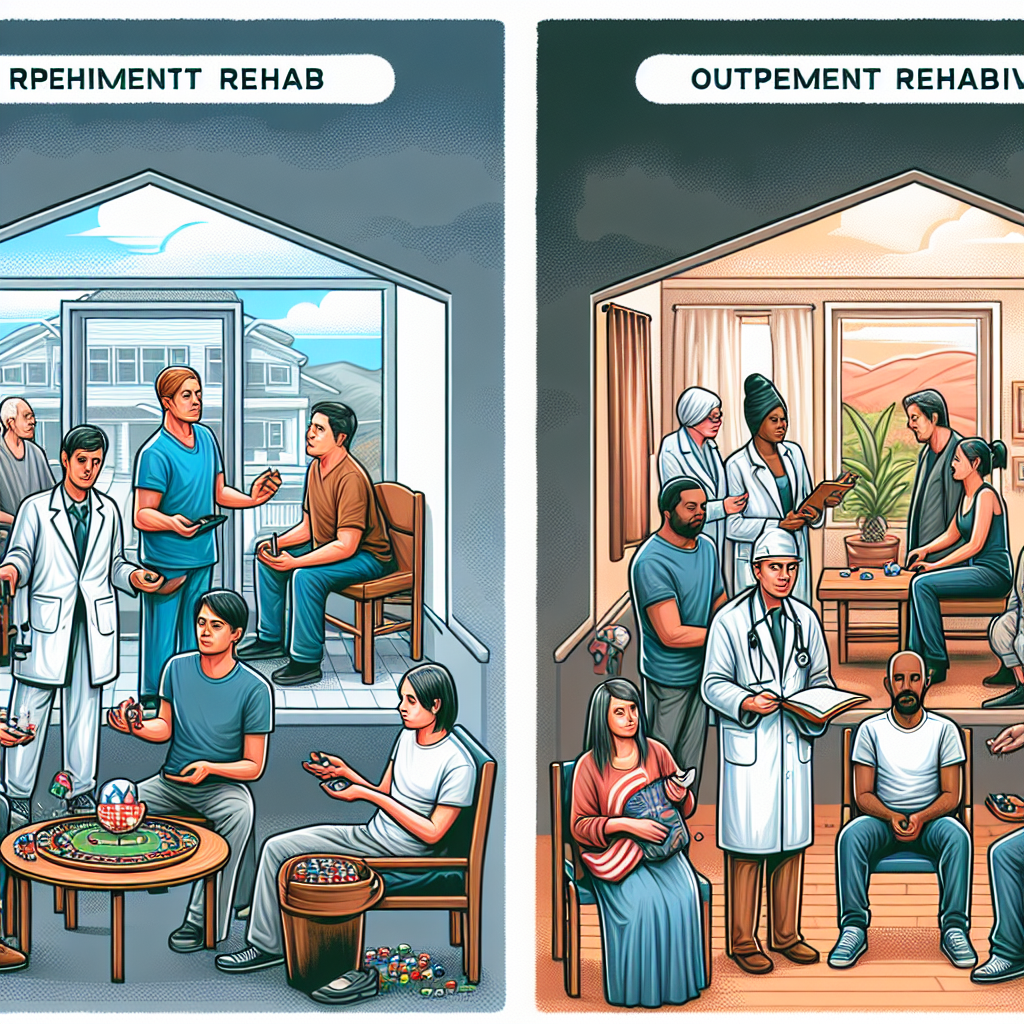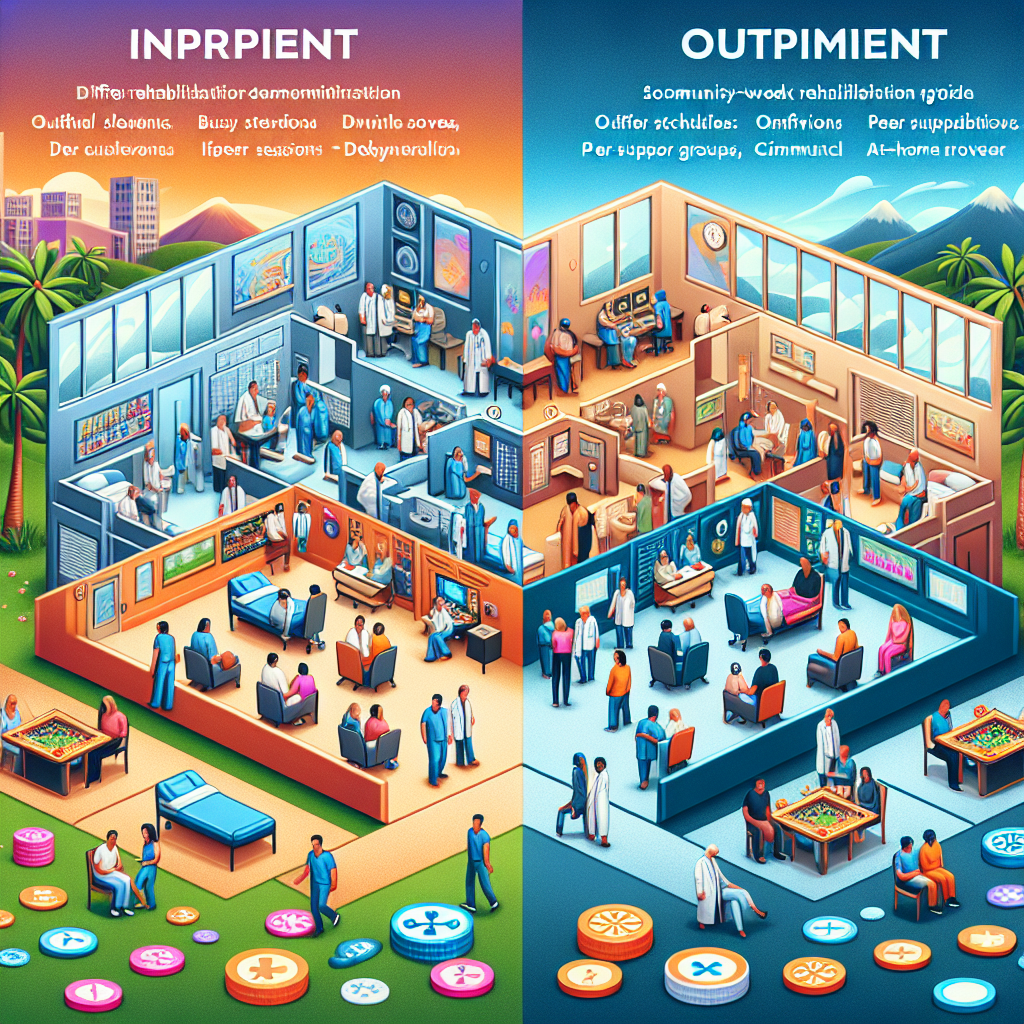-
Table of Contents

“Choosing the Right Path: Inpatient vs. Outpatient Rehab for Gambling Addiction”
Introduction
Gambling addiction, a pervasive and often debilitating disorder, necessitates effective treatment strategies to help individuals regain control over their lives. Two primary modalities for addressing this addiction are inpatient and outpatient rehabilitation programs. Inpatient rehab involves a residential stay at a treatment facility, providing an immersive environment with round-the-clock care and structured support. Conversely, outpatient rehab allows individuals to receive treatment while continuing to live at home, offering flexibility and the ability to maintain daily responsibilities. This introduction aims to compare the benefits, challenges, and suitability of inpatient versus outpatient rehab for gambling addiction, providing a comprehensive understanding of which approach may be more effective based on individual needs and circumstances.
Benefits And Drawbacks Of Inpatient Vs. Outpatient Rehab For Gambling Addiction
When it comes to addressing gambling addiction, choosing the right type of rehabilitation program is crucial for long-term recovery. Both inpatient and outpatient rehab options offer unique benefits and drawbacks, and understanding these can help individuals make informed decisions about their treatment journey. Inpatient rehab, often referred to as residential treatment, involves staying at a facility for a designated period, typically ranging from 30 to 90 days. This immersive environment provides a structured setting where individuals can focus solely on their recovery without the distractions and temptations of the outside world. One of the primary benefits of inpatient rehab is the constant access to professional support and medical care, which can be particularly beneficial for those with severe addiction or co-occurring mental health disorders.
In contrast, outpatient rehab allows individuals to live at home while attending scheduled treatment sessions at a facility. This flexibility can be advantageous for those who have work, school, or family commitments that they cannot abandon. Outpatient programs vary in intensity, with some requiring daily attendance and others meeting a few times a week. The ability to maintain one’s daily routine while receiving treatment can make the recovery process feel less disruptive and more manageable. However, this approach also requires a higher level of self-discipline and motivation, as individuals must navigate their usual environments, which may include triggers and opportunities to gamble.
While inpatient rehab offers a controlled environment that minimizes exposure to gambling triggers, it can also be isolating. Being away from family and friends for an extended period can be challenging, and the transition back to everyday life post-treatment can be daunting. On the other hand, outpatient rehab allows individuals to apply coping strategies in real-time, providing a more gradual adjustment to life without gambling. This real-world application can be empowering, as it helps individuals build resilience and confidence in their ability to manage their addiction.
Cost is another significant factor to consider when comparing inpatient and outpatient rehab. Inpatient programs tend to be more expensive due to the comprehensive care and accommodations provided. For some, the financial burden may be a deterrent, despite the potential benefits of intensive treatment. Outpatient rehab, generally being more affordable, can be a more accessible option for many individuals. Insurance coverage and financial assistance programs can also play a role in determining which type of rehab is feasible.
Support systems are vital in the recovery process, and both inpatient and outpatient programs offer different forms of support. Inpatient rehab often includes group therapy sessions, where individuals can connect with others facing similar challenges, fostering a sense of community and shared understanding. Outpatient programs also offer group therapy, but the support network extends to family and friends who can be involved in the treatment process. This involvement can strengthen relationships and provide a robust support system that continues beyond the duration of the program.
Ultimately, the choice between inpatient and outpatient rehab for gambling addiction depends on individual needs, circumstances, and preferences. Both options have their merits and can lead to successful recovery when approached with commitment and determination. By weighing the benefits and drawbacks of each, individuals can find the path that best supports their journey to a healthier, gambling-free life. The road to recovery is not easy, but with the right support and treatment, it is entirely possible to overcome gambling addiction and reclaim control over one’s life.
Choosing The Right Rehab: Inpatient Or Outpatient Treatment For Gambling Addiction
Choosing the right rehab for gambling addiction is a crucial step towards recovery, and understanding the differences between inpatient and outpatient treatment can help individuals make an informed decision. Both options offer unique benefits and challenges, and the choice largely depends on the individual’s specific needs, circumstances, and the severity of their addiction.
Inpatient rehab, also known as residential treatment, involves staying at a facility for a designated period, typically ranging from 30 to 90 days. This immersive environment provides a structured and supportive setting, which can be particularly beneficial for those with severe gambling addiction. One of the primary advantages of inpatient rehab is the removal of external distractions and triggers. By residing in a controlled environment, individuals can focus entirely on their recovery without the temptations and stresses of daily life. This level of immersion allows for intensive therapy sessions, including individual counseling, group therapy, and various therapeutic activities designed to address the root causes of addiction.
Moreover, inpatient rehab offers a sense of community and camaraderie among residents. Sharing experiences and challenges with others who are on a similar journey can foster a strong support network, which is invaluable during the recovery process. The 24/7 access to medical and psychological support ensures that individuals receive immediate assistance if they experience cravings or emotional distress. This constant supervision can be a critical factor in preventing relapse during the early stages of recovery.
On the other hand, outpatient rehab provides a more flexible approach to treatment, allowing individuals to continue with their daily responsibilities while attending therapy sessions. This option is often suitable for those with less severe gambling addiction or for those who have already completed an inpatient program and are transitioning back to everyday life. Outpatient rehab typically involves regular visits to a treatment center for counseling, group therapy, and educational sessions. The frequency and duration of these visits can vary based on the individual’s progress and needs.
One of the significant benefits of outpatient rehab is its ability to integrate treatment into the individual’s daily routine. This approach allows individuals to apply the coping strategies and skills they learn in therapy to real-life situations immediately. Additionally, outpatient rehab is generally more affordable than inpatient treatment, making it a viable option for those with financial constraints. The flexibility of outpatient programs also means that individuals can maintain their work, school, or family commitments while receiving the necessary support for their recovery.
However, outpatient rehab may not provide the same level of intensity and supervision as inpatient treatment. The lack of a controlled environment means that individuals are more exposed to triggers and temptations, which can increase the risk of relapse. Therefore, outpatient rehab requires a high level of self-discipline and a strong support system outside of the treatment center.
Ultimately, the choice between inpatient and outpatient rehab for gambling addiction depends on various factors, including the severity of the addiction, personal circumstances, and financial considerations. Both options have their merits, and the decision should be made in consultation with healthcare professionals who can assess the individual’s specific needs. Regardless of the chosen path, the commitment to recovery and the willingness to seek help are the most critical steps towards overcoming gambling addiction. With the right support and treatment, individuals can reclaim their lives and build a healthier, more fulfilling future.
Q&A
1. **Question:** What is the primary difference in the treatment environment between inpatient and outpatient rehab for gambling addiction?
**Answer:** The primary difference is that inpatient rehab requires individuals to stay at a treatment facility 24/7, providing a structured and immersive environment, while outpatient rehab allows individuals to live at home and attend scheduled treatment sessions, offering more flexibility.
2. **Question:** How does the level of support differ between inpatient and outpatient rehab for gambling addiction?
**Answer:** Inpatient rehab offers continuous, intensive support with access to medical and therapeutic staff around the clock, whereas outpatient rehab provides periodic support through scheduled therapy sessions and group meetings, relying more on the individual’s self-discipline and external support systems.
Conclusion
In comparing inpatient and outpatient rehab for gambling addiction, it is evident that both approaches offer distinct advantages and cater to different needs. Inpatient rehab provides a structured, immersive environment that can be crucial for individuals with severe addiction, offering 24/7 support and removing external triggers. Outpatient rehab, on the other hand, offers greater flexibility, allowing individuals to maintain their daily responsibilities while receiving treatment. It is generally more cost-effective and can be suitable for those with milder addiction or strong support systems. Ultimately, the choice between inpatient and outpatient rehab should be based on the severity of the addiction, individual circumstances, and the level of support required for successful recovery.



